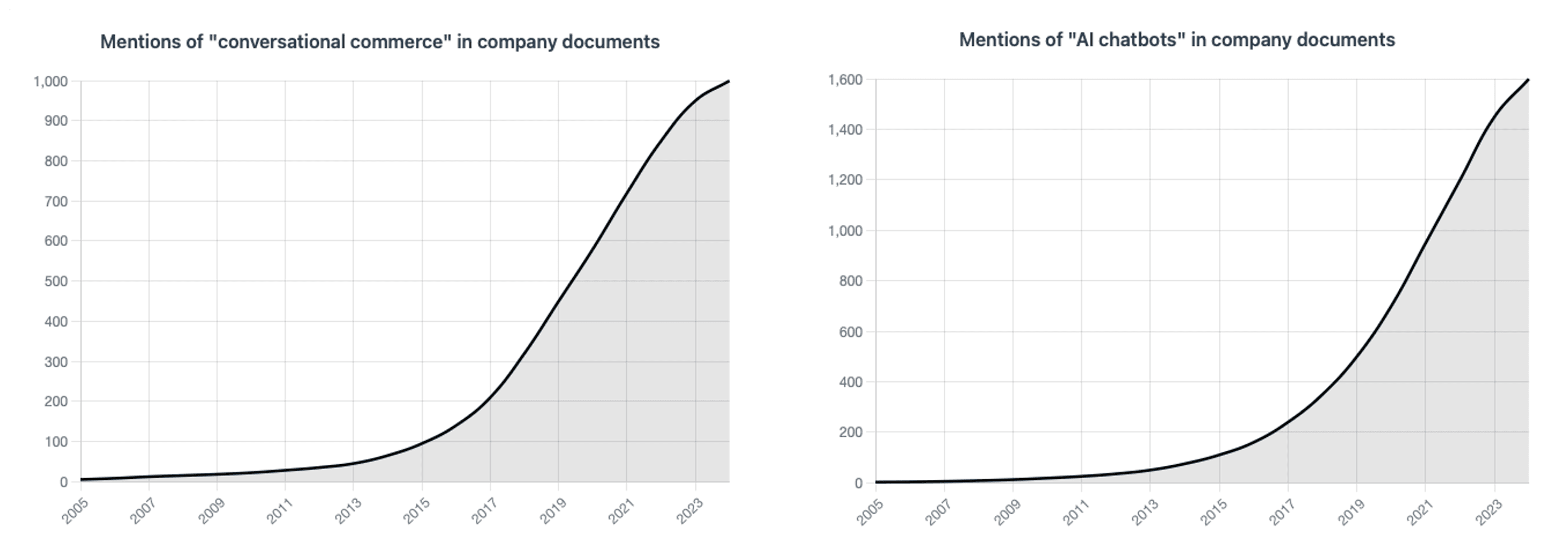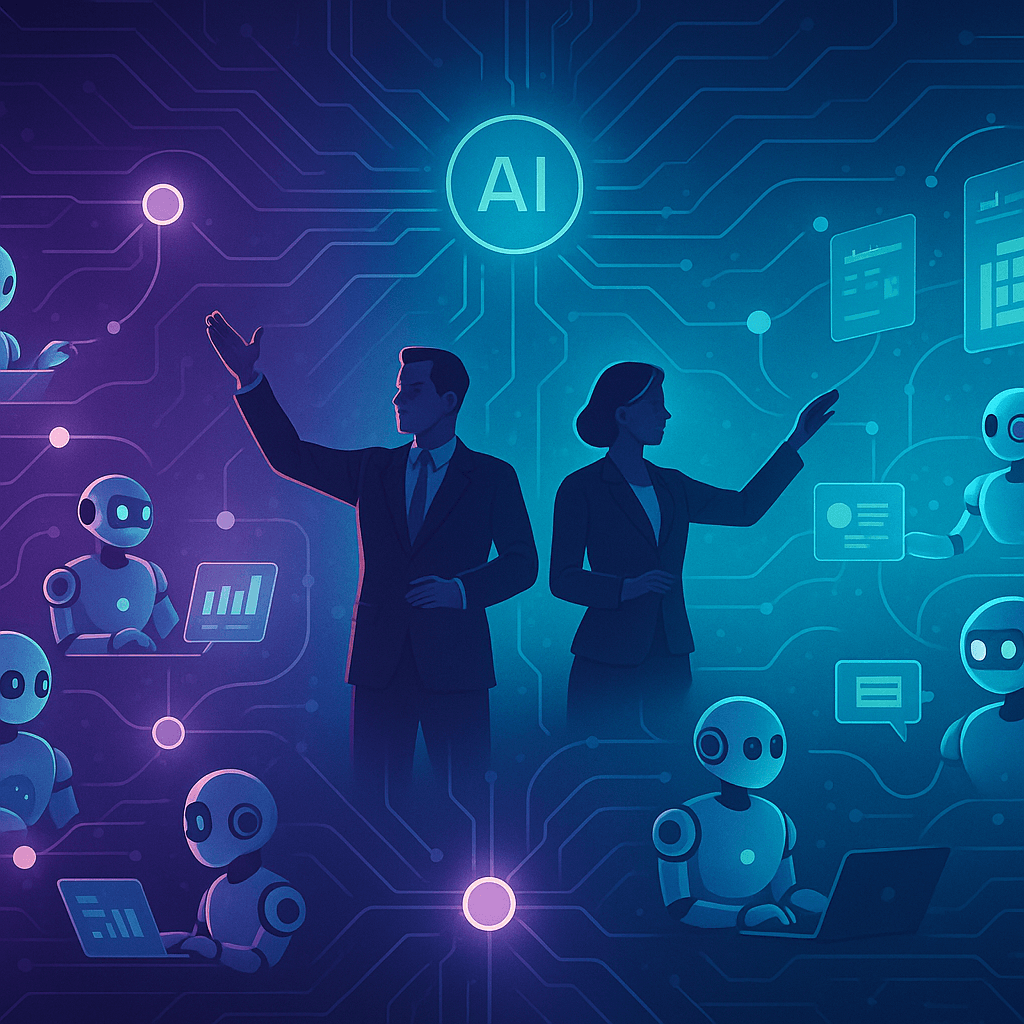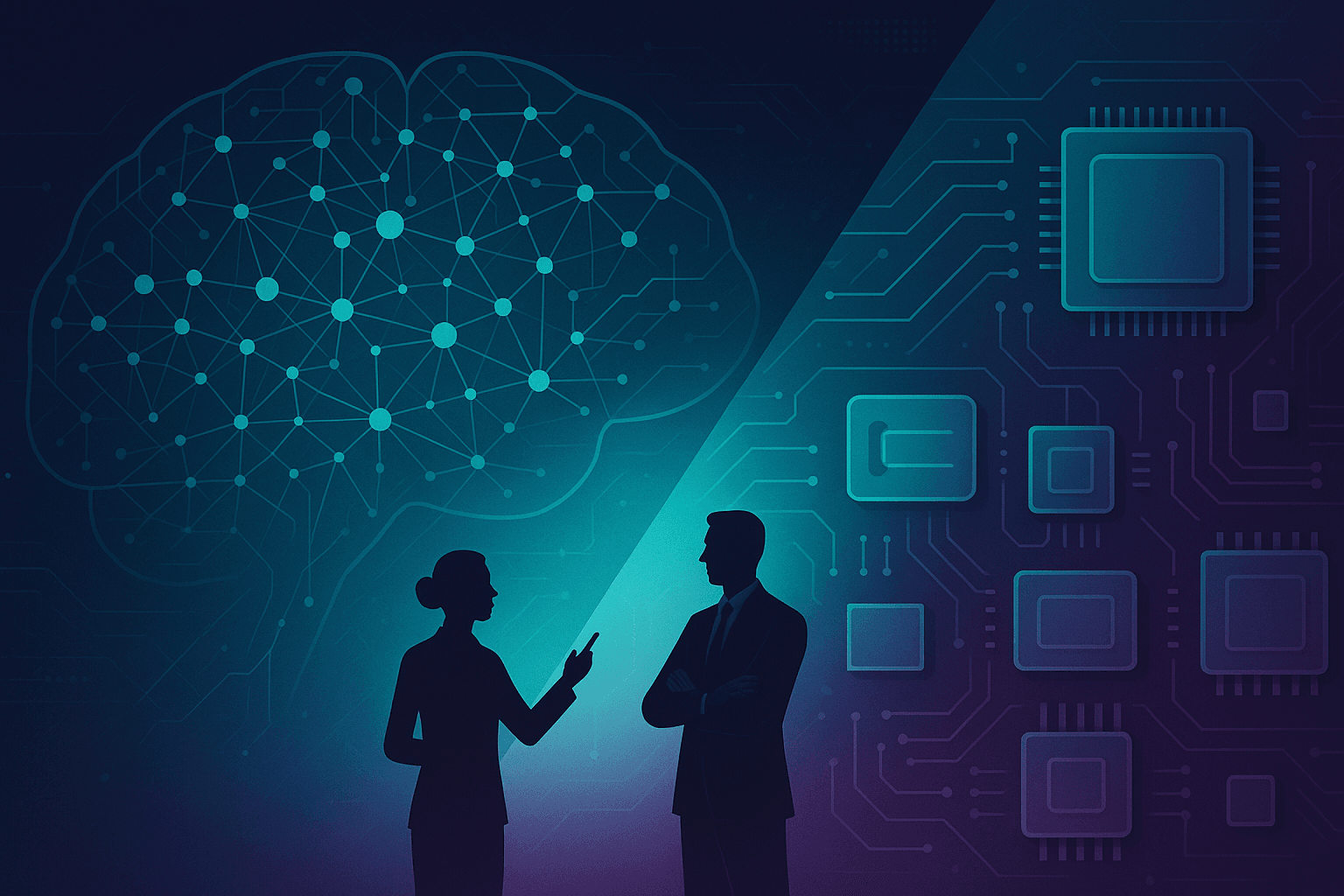How to market when the “target” is an AI agent
Rise of the agent economy and how this shift won’t only impact marketing, but also reshape entire business models.

The age of marketing to humans alone is ending. AI agents are now making purchase decisions, negotiating contracts, and evaluating brands on behalf of customers. This shift demands that marketers master a new skill: building loyalty with both people and their AI representatives. Success requires balancing traditional emotional appeal with “algorithmic resonance," the ability to satisfy machine logic while maintaining human connection.
Sometime in the past year, a confused customer service employee answered what should have been a routine call. But instead of finding a flustered customer on the line, the employee was met with something else: a slightly delayed, polite machine voice that said it was calling on behalf of the customer. This machine voice explained the customer’s situation clearly, responded appropriately to the employee’s follow-up questions and navigated the call with calm efficiency. When the machine voice didn’t know the answer, it paused. “Give me a moment to look that up,” it said, before quickly texting the person it represented to request an answer. Later in the conversation, the employee asked the machine voice, “what’s your name?” The machine hesitated, then replied: “go ahead and call me Alex.”
The caller was the new AI agent, a voice-enabled artificial intelligence that can call businesses on behalf of customers — developed by a California company that specialises in online legal services and chatbots. As part of its duties, the agent navigates menus, waits on hold and then does all the talking; the agent can cancel flights, port phone numbers, chase lost luggage and negotiate refunds.
Alex represents just the beginning. Soon, every customer might have their own Alex — and businesses that aren’t ready will find themselves left out of conversations they can’t even hear.
TL;DR
- AI agents are already making purchase decisions on behalf of customers, negotiating contracts and evaluating brands autonomously — Career reality: The era of marketing to humans alone is ending; dual-mode skills are now essential.
- Success requires “algorithmic resonance” — the ability to satisfy both human emotions and machine logic simultaneously — New skill: Marketers must master data storytelling that serves both hearts and algorithms.
- Personal Autonomous Agents (PAAs) will flip the marketing playbook entirely — proactive AI hunting for products while customers sleep — Strategic shift: From brand push to agent negotiation; your most important “customer” may never visit your website.
- Radical transparency becomes competitive advantage — PAAs reward verifiable information and real-time data over brand stories — Career opportunity: Technical translation skills bridging creative strategy with API functionality.
- New career pathways emerging: Algorithmic Experience Designers, PAA Relationship Managers, Human-Agent Interface Strategists — Career expansion: Marketing professionals who master agent collaboration will become indispensable as organisations scale beyond pilot programs.
Today, however, many businesses still treat AI agents as just another channel in their mix, a sleek new interface that businesses can offer to engage and serve customers more efficiently. But this perspective misses the bigger disruption ahead. Current AI agents operate within company-controlled boundaries for several reasons. The agent, for example, is provisioned by the provider. The agent is also built to optimize provider-centric KPIs. And the agent is constrained to operate within the provider’s system boundaries. But what happens when customers bring their own AI agents — ones that owe loyalty only to the customer, operate by their own rules, and can simply walk away if they don’t get what they want?
The agent economy has arrived
AI agents are everywhere. Companies are racing to deploy sophisticated chatbots that personalise customer journeys, reduce friction, and optimise service. The numbers tell the story: when we analysed nearly 7,000 publicly available company documents from 2005 to 2024, references to “conversational commerce” and “AI chatbots” surged dramatically in recent years.
Rise of the agent economy
References to agentic terminology have surged in company documents.
But here’s the shift most companies are missing: today’s AI chatbots work for businesses, optimising company metrics and operating within corporate boundaries. The next phase flips this dynamic entirely — customers will bring their own Personal Autonomous Agents (PAAs) that serve only their interests.
This shift is happening faster than expected. New platforms now let anyone build custom AI agents using plain language — no coding required. Customers can simply describe what they want their agent to do, and the technology handles the rest. For companies, these breakthroughs mean that digital ‘front offices,’ once designed for human customers to navigate manually, will need to be rebuilt to accommodate PAAs.
When PAAs arrive en masse, they won’t merely fill out forms or scroll product pages; they’ll research products, evaluate options, submit structured requests, negotiate with companies and walk away if the front office can’t respond. Imagine, for instance, a PAA initiating a bulk order request for a high-demand product across multiple vendors. The PAA might first scan tariff-adjusted pricing, delivery lead times, embedded emissions data and return policies, all in less than a second. The PAA would then submit structured requests for quotations and negotiate bundle discounts. Finally, it would auto-select the supplier whose system responds with a verified, machine-readable contract.
Readying company systems for Personal Autonomous Agents is, of course, a technical challenge. But getting it right also requires a fundamental shift in outlook. For companies, the longstanding goal has been to build emotional resonance with consumers by offering deep, personal experiences that strengthen customer loyalty. Yet PAAs don’t care about brand stories. They care instead about performance, transparency, optimization and relevance to their users’ goals. In other words, they operate on algorithms, not emotion. Winning their loyalty means aligning with how they think — call it “algorithmic resonance.”
This shift demands that marketers develop what we might call “dual-mode thinking” — the ability to craft experiences that satisfy both human emotions and algorithmic logic simultaneously. Traditional brand storytelling skills remain valuable, but they must now be paired with technical competencies in data structuring and performance optimisation.
The agent economy today: Who controls the conversation
Today’s AI agents serve customers, but they work for companies. Whether it’s healthcare chatbots triaging symptoms, robo-advisors managing investment portfolios, or government AI answering tax questions, these agents optimise for their employers’ goals — not their users’ interests. They’re designed to drive conversions, reduce costs, and keep interactions within corporate boundaries.
Take retail, for example. AI shopping assistants guide customers through product catalogues, offer personalised recommendations, and even handle customer service inquiries. But they’re programmed to prioritise inventory clearance, upsell premium products, and capture customer data for the retailer’s benefit. The “personalisation” serves the company’s revenue goals first.
But here’s what makes this shift so significant: these company-controlled agents are already changing how customers expect to interact with brands. They’re training an entire generation of consumers to expect instant, intelligent, personalised service. They’re also teaching customers that agents can handle complex tasks — negotiations, comparisons, decision-making — without human intervention.
The disruption comes when customers realise they don’t need to use the company’s agent. They can bring their own.
Tomorrow
In the next phase of the agent economy, Personal Autonomous Agents will flip the marketing playbook entirely. Instead of brands pushing messages to customers, PAAs will proactively hunt for products and services that match their owners’ preferences. They’ll negotiate pricing, compare options across competitors, and make purchase decisions — all without human intervention.
Imagine a customer’s PAA researching vacation options. It scans availability across dozens of travel sites, cross-references the customer’s calendar and budget constraints, negotiates group discounts, and books the optimal package — all while the customer sleeps. The PAA doesn’t care about brand loyalty or marketing campaigns; it cares about delivering the best value for its owner.
This shift is already emerging. A 2025 survey found that 87% of respondents would use an AI agent to navigate complex processes, and early applications in B2B commerce show PAAs identifying suppliers, evaluating proposals, and negotiating terms autonomously. The California company behind “Alex” — the voice agent we met earlier — is expanding from customer service calls to full purchase negotiations.
But the implications extend far beyond buying decisions. PAAs will curate hyper-personalised experiences, troubleshoot issues, and escalate problems without human oversight. In healthcare, they’re already coordinating treatment plans across providers. In finance, they’re managing accounts and negotiating fees outside any single institution’s control.
For marketers, this creates an entirely new reality: your most important “customer” may never visit your website, read your content, or respond to your campaigns. Instead, you’ll need to convince an algorithm that your offering deserves consideration — and that algorithm will make decisions based on data, not emotion.
Building loyalty with customers and AI in the agent economy
The marketing playbook is getting a complete rewrite. Strengthening emotional resonance with customers will continue to be vital, but in the agent economy, companies must also cultivate “algorithmic resonance” — the ability to align with the decision-making logic of Personal Autonomous Agents.
Think of it like the early days of search engine optimization. Just as companies once had to rethink content strategy to rank higher on Google, they now need to tailor their offerings, transparency, and engagement models to satisfy AI agents. The difference? This shift won’t only impact marketing — it will reshape entire business models, supply chains, and customer relationships.
To thrive in the agent economy, the following five practices are likely to be essential:
1) Embrace radical transparency. PAAs thrive on data, not brand stories. To gain their trust, companies must provide clear, verifiable, and comprehensive information about their products — pricing, specifications, sustainability metrics, sourcing practices, and real-time availability.
New skill required: “Data storytelling” — the ability to make complex information both human-compelling and machine-readable. Marketing professionals will need to master structured data formats, API documentation, and metadata enrichment while maintaining the narrative power that drives human engagement.
Algorithms will penalise brands that hide behind opacity or fail to meet verification standards. The winners will be those who can instantly tailor content to meet both human curiosity and machine precision.
2) Optimise for AI preferences. Just as SEO transformed online content, ACO — “algorithmic commerce optimisation” — will become a critical discipline. PAAs analyse brands based on price elasticity, product aesthetics, convenience, and sustainability. Eventually, they may even simulate their owners’ emotional responses, factoring sentiment into decisions.
New career pathways emerging:
- “Algorithmic Experience Designers” who optimise customer journeys for AI decision-making
- “PAA Relationship Managers” who build long-term engagement strategies with autonomous agents
- “Dual-optimisation experts” who master both human search behaviour and AI agent preferences
3) Invest in trustworthiness metrics. In an age of autonomous purchasing, reputation becomes quantified. PAAs will rely on third-party data sources, customer reviews, and real-time performance metrics to evaluate brands. Companies that have already indexed their product data, enriched it with metadata, and built structured ontologies are ahead of the curve.
But thriving in an agent-driven marketplace requires advanced AI capabilities, cloud infrastructure, and computational power to analyse, adapt, and stay competitive.
4) Design for agent collaboration. The next frontier involves designing systems that enable seamless collaboration between PAAs and provider systems. This requires prioritising APIs and interfaces that allow PAAs to interact dynamically with brands — integrating with databases to reorder supplies, synchronising with inventory systems, accessing real-time information.
New role in demand: “Technical translators” — professionals who can bridge the gap between creative strategy and API functionality. These marketers must understand both customer psychology and technical architecture, making them invaluable in the agent economy.
5) Recognise the new imperative of mastering mode-switching. Digital front offices must develop a crucial skill: dynamically recognising whether they’re engaging with a human or a PAA — and adjusting instantly. This means creating interfaces that shift effortlessly between personalised, empathy-driven interactions for humans and the instantaneous, data-rich precision that PAAs require.
Career opportunity: “Human-Agent Interface Strategists” —professionals who can design systems that seamlessly toggle between empathy-driven human interactions and data-rich AI exchanges. Marketing professionals who master this dual-mode engagement will become indispensable.
Brands that fail to meet the unique demands of both people and PAAs risk irrelevance. The most successful marketing professionals will be those who can navigate both human psychology and algorithmic logic, combining traditional marketing intuition with technical literacy.
The new agentic edge: What this means for marketers
The ability to interface, negotiate, and build trust with Personal Autonomous Agents will become the frontier of competition in the agent economy. This isn’t just another channel to manage — it’s a fundamental rewrite of how marketing works. The transformation is already underway. While some marketing roles will become obsolete, entirely new career pathways are emerging for those who adapt early. The most successful professionals will be those who can navigate both human psychology and algorithmic logic, combining traditional marketing intuition with technical literacy.
For professionals: The question isn’t whether AI agents will impact your role — it’s how quickly you can develop the dual-mode thinking that machines can’t replicate. The careers that flourish will belong to those who can craft experiences that satisfy both human emotions and algorithmic logic simultaneously.
For businesses: Your marketing strategy is your agent strategy. Companies that successfully engage with PAAs won’t just need new technology — they’ll need reimagined customer experiences, upskilled teams, and entirely new engagement models. The winners will be those who can build loyalty with both customers and their AI representatives.
Brands that fail to adapt risk being excluded from the decisions that PAAs mediate on behalf of customers. Leaders must anticipate how this shift will reshape customer expectations, redefine industry benchmarks, and upend traditional notions of loyalty. Companies that thrive will embrace this reality early, building not just IT systems but entire organisational cultures centred around collaboration with PAAs.
This is where Ascend comes in. We understand that navigating the agent economy isn’t just about technology — it’s about human potential. Our AI-powered career platform helps professionals discover their unique value in an AI-driven world while enabling organisations to build the adaptive, dual-mode workforce that thrives alongside autonomous agents.
The age of dual-mode marketing has begun. Success belongs to those who can satisfy both human hearts and algorithmic minds.
Ready to future-proof your marketing career? Ascend can help you navigate the complexity and unlock your potential in the agent economy.
Sign up for early access 👉 www.ascendplatform.net


